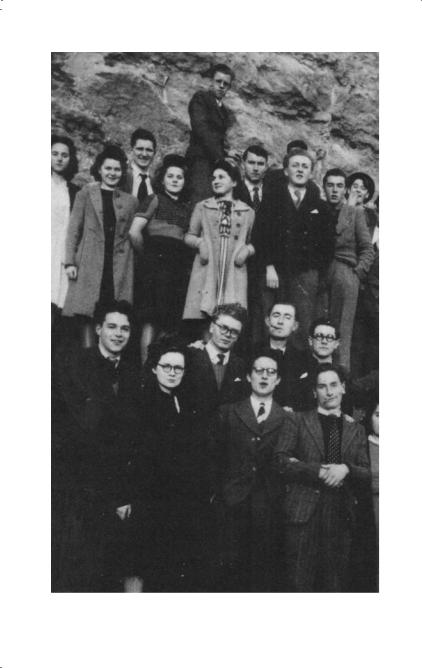
Foucault - A Very Short Introduction
.pdf
This page intentionally left blank

Acknowledgements
I wrote the first draft of this essay during summer 2003, in conjunction with my seminar on Foucault at the Johann Wolfgang Goethe Universität in Frankfurt. Many thanks to Axel Honneth for his invitation and many kindnesses, to the students in my Foucault seminar for their interest and questions, and to the staff at the Literaturhaus Restaurant (especially Oliver and Franz) for their hospitality, good food, and splendid wine.
As always, the first and best reader of my manuscript was my wife, Anastasia Friel Gutting. I am also grateful for very helpful comments from Jerry Bruns and Todd May. My thanks to Marsha Filion of OUP for suggesting and supporting this project.

This page intentionally left blank

Abbreviations
The following abbreviations are used throughout to denote works by Foucault.
Foucault’s books
AK (DL) The Archaeology of Knowledge, tr. Alan Sheridan (New York:
|
Vintage, 1972). Also includes ‘The Discourse on Language’ |
|
(DL), a translation of L’ordre du discours, Foucault’s |
|
inaugural address at the Collège de France. |
BC |
The Birth of the Clinic, tr. Alan Sheridan (New York: Vintage, |
|
1973). |
CS |
The Care of the Self, Volume 3 of The History of Sexuality, |
|
tr. Robert Hurley (New York: Vintage, 1986). |
HF |
Histoire de la folie à l’âge classique (Paris: Gallimard, 1972). |
HS |
The History of Sexuality, Volume 1: An Introduction, |
|
tr. Robert Hurley (New York: Vintage, 1978). |
DP |
Discipline and Punish, tr. Alan Sheridan (New York: |
|
Vintage, 1977). |
MC |
Madness and Civilization, tr. Richard Howard (New York: |
|
Vintage, 1965). This is a greatly abridged translation |
|
of HF. |
OT |
The Order of Things, tr. Alan Sheridan (New York: Vintage, |
|
1970). Translation of Les mot et les choses. |

RRDeath and the Labyrinth: The World of Raymond Roussel, tr. Charles Ruas (Garden City, New York: Doubleday and Co., 1986). Translation of Raymond Roussel. Includes an interview of Foucault by Charles Ruas.
UP The Use of Pleasures, Volume 2 of The History of Sexuality,
tr. Robert Hurley (New York: Vintage, 1985).
Collections of Foucault’s articles, lectures, and interviews
DE |
Daniel Defert and François Ewald (eds), Dits et écrits, |
|
1954–1988, four volumes (Paris: Gallimard, 1994). Includes |
|
virtually everything, other than his books, that Foucault |
|
published. |
EW |
The Essential Works of Michel Foucault, ed. Paul Rabinow. A |
|
three-volume translation of selections from Dits et écrits. |
EW I |
Volume 1, Ethics: Subjectivity and Truth, ed. Paul Rabinow, |
|
tr. Robert Hurley et al. (New York: New Press, 1997). |
EW II |
Volume 2, Aesthetics: Method and Epistemology, ed. James |
|
Faubion, tr. Robert Hurley et al. (New York: New Press, |
|
1998). |
EW III |
Volume 3, Power, ed. James Faubion, tr. Robert Hurley et al. |
|
(New York: New Press, 2000). |
P/K |
Colin Gordon (ed.), Power/Knowledge: Selected Interviews |
|
and Other Writings, 1972–1977 (New York: Pantheon, |
|
1980). |
PPC |
Lawrence Kritzman (ed.), Michel Foucault: Philosophy, |
|
Politics, Culture, tr. Alan Sheridan (London: Routledge, |
|
1988). |
These last two collections contain some important pieces not in EW.

List of illustrations
1Foucault at the top
|
of his class |
3 |
|
Private collection |
|
2 |
Raymond Roussel, |
|
|
1895 |
5 |
|
© Rue des Archives |
|
3 |
Georges Bataille |
16 |
|
© Photos12.com/Interfoto |
|
4 |
Foucault and Sartre |
22 |
|
© Gérard Aimé |
|
5Foucault talking at W. Berlin Technical
University, 1978 |
28 |
© Raymond Depardon/
Magnum Photos
6Georges Cuvier examining animal
fossils |
38 |
© Bettmann/Corbis
7‘The Holy Trinity’: Lou Salomé, Paul Rée, and
|
Friedrich Nietzsche, |
|
|
1882 |
48 |
|
© akg-images |
|
8 |
Immanuel Kant |
56 |
|
© 2004 TopFoto.co.uk |
|
9 |
Gaston Bachelard |
64 |
|
© Rue des Archives |
|
10Pinel Freeing the Insane
(1876), oil painting by
Tony Robert-Fleury |
69 |
Salpêtrière Hospital, |
|
Paris |
|
© Photos12.com/ARJ |
|
11 Illinois State |
|
Penitentiary |
83 |
© Bettmann/Corbis |
|
12Foucault and the judges, during the filming of Moi,
Pierre Riviere |
85 |
© René Allio/DR

13 Foucault at |
|
14 Foucault at Berkeley 110 |
home, 1978 |
97 |
Courtesy of Paul Rabinow |
© Martine Franck/Magnum |
|
|
Photos |
|
|
The publisher and the author apologize for any errors or omissions in the above list. If contacted they will be pleased to rectify these at the earliest opportunity.

Chapter 1
Lives and works
Do not ask who I am . . .
I give Foucault the first word: ‘Do not ask who I am and do not ask me to remain the same . . . Let us leave it to our bureaucrats and our police to see that our papers are in order’ (AK, 17).
He has his wish, since quite different readings of his life are supported by the known facts. One version of his story is a standard one of progressive academic success:
The son of a prominent provincial family, his father a successful doctor, Paul-Michel Foucault was a brilliant student, a star even, at the prestigious École Normale Supérieure. His academic and political connections enabled him to avoid the high-school teaching usually expected in France of those with philosophical academic ambitions. Instead, he spent several Wanderjahren in Sweden, Poland, and Germany, while finishing his dissertation, which was sponsored by one of the most powerful professors at the Sorbonne and, once published, gained favourable reviews from leading intellectuals. In the course of the next eight years he moved easily through a series of professorships. His 1966 book, Les mots et les choses, was an academic bestseller that made him the leading candidate to succeed Sartre as the French ‘master-thinker’. A few years later, he won election to the super-elite Collège de France
1

(following Bergson and Merleau-Ponty), which put him at the pinnacle of the French academic world and relieved him of ordinary teaching obligations. From then on, he travelled the world (to Japan, Brazil, California, among other countries) lecturing to packed halls, increasingly engaged in high-profile political actions, and still managing to write brilliant books on crime and sex that have made him a major figure in every humanistic and social scientific discipline. By the time he died, in 1984, he had already been the subject of dozens of books, and his posthumous fame has only increased.
But there is another, equally plausible version:
Foucault
Foucault was a brilliant but emotionally troubled son of an authoritarian physician. A tormented homosexual, he may have attempted suicide while at the École Normale and was certainly under psychiatric care. He so hated French society that he fled to a series of marginal posts in foreign countries, where, however, he failed to find the liberation he sought. Despite spectacular intellectual success, he spent his life seeking extreme sensations (‘limit-experiences’, as he called them) from drugs and sadomasochistic sex, and died before he was 60 from AIDS, probably contracted at San Francisco bathhouses.
We can also tell the story of his life as one of political and social commitment and activism:
Foucault was fiercely independent and committed from the beginning to his own and others’ freedom. His hatred of oppression flared out in the midst of the most complex and erudite discussions. He saw even his most esoteric intellectual work as contributing to a ‘toolbox’ for those opposing various tyrannies. And he had the effect he desired: he was a hero of the anti-psychiatry movement, of prison reform, of gay liberation, . . .
None of these stories are false, but their mutual truth keeps us from
2

1. Foucault at the top of his class, Poitiers, 1944
